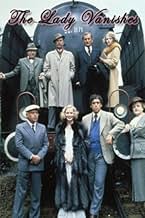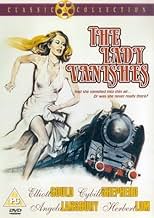AVALIAÇÃO DA IMDb
6,0/10
3,2 mil
SUA AVALIAÇÃO
Adicionar um enredo no seu idiomaOn a train in Germany, American heiress Amanda Kelly befriends older nanny Miss Froy. When Miss Froy vanishes, everyone Amanda asks denies having seen her. Eventually, Amanda persuades Ameri... Ler tudoOn a train in Germany, American heiress Amanda Kelly befriends older nanny Miss Froy. When Miss Froy vanishes, everyone Amanda asks denies having seen her. Eventually, Amanda persuades American photographer Bob Condon to help her search.On a train in Germany, American heiress Amanda Kelly befriends older nanny Miss Froy. When Miss Froy vanishes, everyone Amanda asks denies having seen her. Eventually, Amanda persuades American photographer Bob Condon to help her search.
- Direção
- Roteiristas
- Artistas
Gary McDermott
- Baroness's Manservant
- (as Garry McDermott)
Avaliações em destaque
Remake of a British 1938 Michael Redgrave film with Dame Mae Witty and Margaret Lockwood. The 1979 version, done as a Cybill Shepherd and Elliott Gould vehicle, pushes mainly its comedic/farcical elements instead of it being s legitimate mystery itself. The political intrigues and treacheries of the years between the First and Second World Wars made a better basis for the 1938 film than the 1979 film had. Alfred Hitchcock had still been in Britain when his 1938 film was made. Hitchcock had a sure hand utilizing the looming dangers and unease of the time, just one year prior to Britain's actual 1939 entry into WWII. The 1979 film isn't rotten but it simply doesn't hold up when weighed against Hitchcock's original. If you watch the 1979 movie, do so expecting a comedy not a mystery, and do so before you ever have seen the Hitchcock version.
It's an unpopular and even downright blasphemous idea to remake a great Alfred Hitchcock classic. It is now, and it definitely was in the late 70s, when the Master of Suspense himself was still alive. "The Lady Vanishes" flopped at the box office, received harshly negative reviews, was the symbolical last effort of Hammer Studios, and still isn't very appreciated nowadays based on the other user-comments around here.
And yet, I personally feel that "The Lady Vanishes" deserves a bit more recognition and praise, and this for the plain and simple fact that I found it very amusing. The plot is still compelling four decades later, the cast is tremendous, Cybill Shepard never looked more gorgeous than here in her white dress, and random conversations about cricket were never as funny.
Reverting to comparisons between this version and Hitchcock's classic is inevitable, though. The 1979 update is undeniably weaker for two reasons. First, because here there never is any doubt whether there was a Miss Froy who suddenly vanishes from the train departing from Bavaria. Shepard's character Kelly is very certain of herself and doesn't allow anyone to convince her otherwise, and it also doesn't help that we follow Miss Froy (Angela Lansbury) throughout the entire "Sound of Music" reminiscent opening credit sequences as she walks down a mountain and checks into a hotel. Secondly, there's the hindsight effect. What I mean by this is that Hitchcock's original was made and released in 1938; - slightly more than a year before the outbreak of WWII. Hitch made fabulous use of the contemporary political tensions and social unrest, and it greatly benefitted the atmosphere of his film. Anthony Page, like every other director since 1945, is forced to approach the plot with hindsight and that simply cannot be as intense.
Never mind the negativity, though, and enjoy "The Lady Vanishes" with all its misplaced comedy and unspectacular action. Cybill's best line: "despite your ridiculous haircut, I'm falling for you". Because, let's face it, Elliot Gould's hair is quite silly.
And yet, I personally feel that "The Lady Vanishes" deserves a bit more recognition and praise, and this for the plain and simple fact that I found it very amusing. The plot is still compelling four decades later, the cast is tremendous, Cybill Shepard never looked more gorgeous than here in her white dress, and random conversations about cricket were never as funny.
Reverting to comparisons between this version and Hitchcock's classic is inevitable, though. The 1979 update is undeniably weaker for two reasons. First, because here there never is any doubt whether there was a Miss Froy who suddenly vanishes from the train departing from Bavaria. Shepard's character Kelly is very certain of herself and doesn't allow anyone to convince her otherwise, and it also doesn't help that we follow Miss Froy (Angela Lansbury) throughout the entire "Sound of Music" reminiscent opening credit sequences as she walks down a mountain and checks into a hotel. Secondly, there's the hindsight effect. What I mean by this is that Hitchcock's original was made and released in 1938; - slightly more than a year before the outbreak of WWII. Hitch made fabulous use of the contemporary political tensions and social unrest, and it greatly benefitted the atmosphere of his film. Anthony Page, like every other director since 1945, is forced to approach the plot with hindsight and that simply cannot be as intense.
Never mind the negativity, though, and enjoy "The Lady Vanishes" with all its misplaced comedy and unspectacular action. Cybill's best line: "despite your ridiculous haircut, I'm falling for you". Because, let's face it, Elliot Gould's hair is quite silly.
I only wished this remake would have done the vanishing!
Awful remake of the classic Hitchcock suspense thriller that is marred by the idiotic casting of Gould and Shephard, who spend most of their time turning the mystery into laughs. Lansbury breathes the most life into the film as Miss Froy.
Awful remake of the classic Hitchcock suspense thriller that is marred by the idiotic casting of Gould and Shephard, who spend most of their time turning the mystery into laughs. Lansbury breathes the most life into the film as Miss Froy.
There's a strong tendency to compare Hitchcock's version of "The Lady Vanishes" with the 1979 version starring Elliot Gould, Cybill Shepherd, and Angela Lansbury. There's no need to do so. Both have the same title but entirely different moods. This doesn't make one "better" or "worse" than the other. They just should be judged on their own merits.
Both are thrillers, one more somber and tense, and the latter version more of a melodramatic mystery with comedic touches.
What I would suggest is that the viewer simply watch both versions, recognizing the strong and weak points of each. Both are enjoyable, but to interject a personal note, I tend to lean toward this 1979 version for its tone that's more like other mystery films such as "Charade" or "North By Northwest".
Enjoy them both as different cinematic expressions and let others worry about comparisons.
Both are thrillers, one more somber and tense, and the latter version more of a melodramatic mystery with comedic touches.
What I would suggest is that the viewer simply watch both versions, recognizing the strong and weak points of each. Both are enjoyable, but to interject a personal note, I tend to lean toward this 1979 version for its tone that's more like other mystery films such as "Charade" or "North By Northwest".
Enjoy them both as different cinematic expressions and let others worry about comparisons.
Its inevitable that this would be compared to Hitchcock's 1938 original but for me there are many pleasures to be had in this elegant comedy-thriller. Douglas Slocombe's Panavision photography is wonderful and the playing of all involved is beautifully poised. George Axelrod's reworking of Sidney Gilliat's screenplay adds a nice screwball touch with his one-liners and Ian Carmichael and Arthur Lowe as the cricket-obsessed British tourists add humanity to their chauvinistic bullishness. And as a self-confessed Angela Lansbury fan I of course relished her depiction of Miss Froy. On a big cinema screen this looks terrific.
Você sabia?
- CuriosidadesThough Cybill Shepherd only wears one costume in the movie, (a bias-cut white satin dress), the costume department made nine identical copies to facilitate filming.
- Erros de gravaçãoNear the end of the movie, when the train is backed up to the yard, and Amanda has switched the points, she runs towards the train as it is leaving. The track they pass over passes the locomotive when the camera shows Robert reaching for her, but when the camera shows her running, she has yet to run over the track until the end, when Robert picks her up.
- ConexõesFeatured in Siskel & Ebert & the Movies: Hail, Hail, Black and White (1989)
Principais escolhas
Faça login para avaliar e ver a lista de recomendações personalizadas
Detalhes
- Data de lançamento
- País de origem
- Idiomas
- Também conhecido como
- La dama desaparece
- Locações de filme
- Empresas de produção
- Consulte mais créditos da empresa na IMDbPro
Bilheteria
- Orçamento
- £ 2.500.000 (estimativa)
- Tempo de duração
- 1 h 37 min(97 min)
- Mixagem de som
- Proporção
- 2.35 : 1
Contribua para esta página
Sugerir uma alteração ou adicionar conteúdo ausente



































